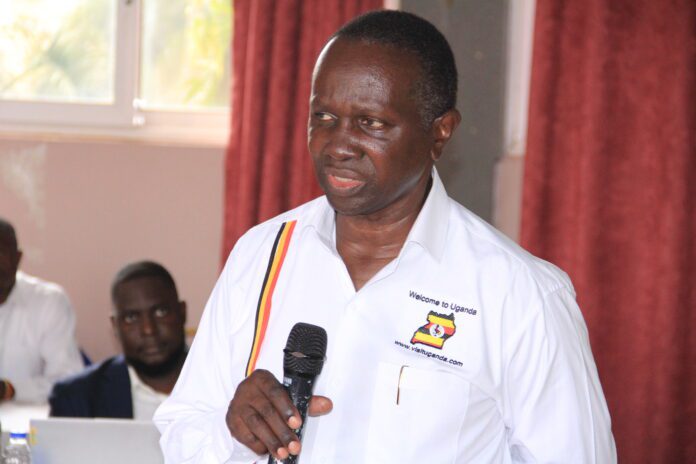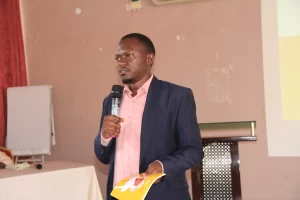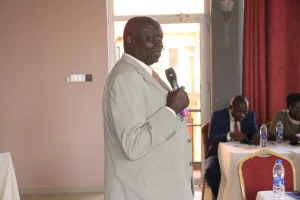
The former Minister of Lands in the cabinet of Uganda, Daudi Migereko, has asked the Resident District Commissioners (RDCs), Resident City Commissioners (RCCs), deputies, Assistant RCCs and ARDCs, and District Internal Security Officers (DISOs) to help the local populace attain sustainable development by mobilizing them to access government support.
Migereko was giving an address to senior city and district leaders from the Bugisu and Sebei sub-region who were attending a three-day capacity-building retreat at Wash and Wills Hotel in Mbale city on Tuesday, December 10, 2024.
He urged leaders to interest themselves with the National Development Plan IV (NDPIV) since it mainly focuses and deals with the national budget for service delivery.
The former minister, however, advised participants to operate within the guidelines of the constitution of Uganda and the Local Government Act.
“Because of the challenges associated with land, you need to be conversant with the Land Act and directives of the President,” Migereko said.
Read Also: Hajj Kakande Roots for Effective Service Delivery to Promote Economic Growth
Migereko told the leaders to understand the historical perspective of their areas of operation in terms of performance, citing the NRM manifesto report, which he said relays the performance of different sectors in the country.
He cautioned the leaders to work hard and execute their duties as prescribed, calling for teamwork and coordination in their leadership roles. Migereko, therefore, asked participants to utilize and take advantage of the security agencies in the area and other stakeholders, including police, UPDF, and LCs, respectively, by coordinating with them to ensure security is maintained.
“Your prime responsibility is to ensure peace and security in your area of jurisdiction. Know that you are responsible for the safety of citizens in your area,” Migereko noted.
The former minister highlighted the issue of cattle theft and rustling, which he said “shakes and tests the strength and capability of the leadership and government in power.”
He asked them to formulate research teams, saying that research informs decisions. Migereko further advised leaders to take the direction of economic empowerment to help locals join the money economy, urging participants to work with stakeholders for easy implementation of government programs. As a result, he implored leaders to be well informed and utilize the media.
“You must come up with a mechanism or strategy to ensure sensitization and implementation of government programs is done to achieve economic growth,” Migereko highlighted.
On the issue of GROW money, where participants highlighted the challenges associated with accessing funds where banks issue their loans as opposed to GROW funds, Migereko called for engagement with the banks responsible to ensure that people access the funds, urging them to take the trouble to make sure important programs succeed in their areas.
Additionally, participants said that there’s a lot of bureaucracy in GROW money, citing people having to first register companies, which the minister said are operational standards that need to be followed so that they succeed sustainably.
“The bank managers need to be engaged so that people are able to access the GROW money,” he said.
Agricultural Sustainability
On issues related to agriculture, especially coffee farming, the minister called for sensitization of the local farmers in relation to value addition, urging leaders to guide farmers to attain economic growth. Nonetheless, Marvin Ssenkungu, an Economist in the Manifesto Implementation Unit, highlighted the performance of the agriculture sector, which he said grew by 5.1%, contributing 24.6% to total GDP.
“Today, coffee is our number one export in Uganda. Mbale is making a lot of money from coffee, as RDCs reach out to the local farmers on value addition,” Migereko said.

Education Performance
Regarding education, Migereko said that the government and President Museveni have picked interest in that field, citing that the government wants a secondary school in each sub-county nationwide. Ssenkungu further highlighted that the sub-region entails 97 sub-counties, and out of those, 76 have secondary schools while 70 don’t, giving an overall coverage of 79% in the region.
According to Ssenkungu, the government’s plan is to also have a primary school in each parish to lower illiteracy levels and to ensure that all school-going children attain education. He highlighted that the sub-region has 415 parishes, and out of those, 392 have primary schools while 23 don’t have, contributing to 95% coverage.
Lt Col (Rtd) Kibrian Ambako, a Senior Presidential Advisor in the Office of the President, asked leaders to carry out impact assessments in their areas to understand the performance of government programs and come up with a factual report on the challenges affecting the region.

Bugisu and Sebei sub-regions are still facing various challenges, including land wrangles, climate change, where landslides and floods recently hit the region and over 15 lives were lost, HIV/AIDS, and high levels of poverty irrespective of the government’s initiative to initiate programs like PDM, Emyooga, and the 4-acre model in the region. This calls for the leaders to intensify efforts to put an end to such.














